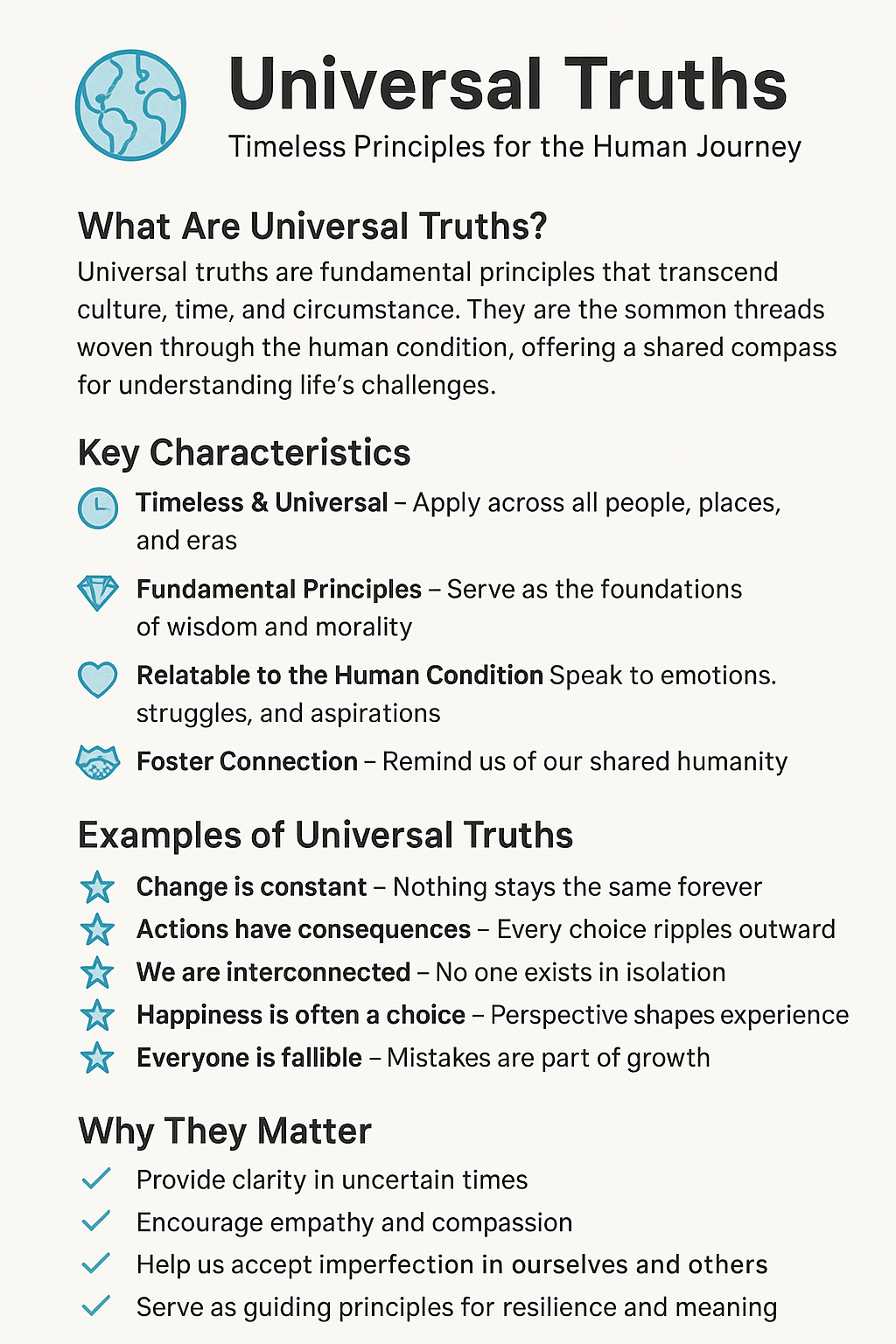Blog
- Timeless Principles for the Human Journey
Universal Truths: Timeless Principles for the Human Journey
What Are Universal Truths?
Universal truths are fundamental principles that transcend culture, time, and circumstance. They are the common threads woven through the human condition, offering a shared compass for understanding life’s challenges.
Key Characteristics
Timeless & Universal – Apply across all people, places, and eras.
Fundamental Principles – Serve as the foundations of wisdom and morality.
Relatable to the Human Condition – Speak to emotions, struggles, and aspirations.
Foster Connection – Remind us of our shared humanity.
Examples of Universal Truths
Change is constant – Nothing stays the same forever.
Actions have consequences – Every choice ripples outward.
We are interconnected – No one exists in isolation.
Happiness is often a choice – Perspective shapes experience.
Everyone is fallible – Mistakes are part of growth.
Why They Matter
Provide clarity in uncertain times.
Encourage empathy and compassion.
Help us accept imperfection in ourselves and others.
Serve as guiding principles for resilience and meaning.
Recognizing universal truths isn’t about dogma — it’s about cultivating wisdom, humility, and connection in a world of constant change.
We are interconnected – No one exists in isolation.
This universal truth is one of the most profound. Let’s break it down:
We are interconnected – No one exists in isolation
1. Human Level (Social & Emotional):
-
From birth, survival depends on connection — parents, caregivers, and communities.
-
Our identities, values, and beliefs are shaped by relationships with family, friends, and society.
-
Even when someone tries to live “alone,” they are still influenced by language, culture, and ideas created by others.
2. Biological Level (Scientific):
-
Ecosystems show interdependence: plants produce oxygen, animals produce carbon dioxide, pollinators sustain food sources.
-
Microbiomes (bacteria in our bodies) help us digest food, regulate immunity, and sustain life.
-
Every human breath contains molecules once inhaled by countless others — a literal exchange of life.
3. Global/Economic Level:
-
Modern economies are deeply connected — food, technology, and goods often come from supply chains spanning dozens of countries.
-
Crises (like pandemics or climate change) reveal how an event in one region can ripple globally.
-
Our well-being increasingly depends on collaboration across nations.
4. Philosophical/Spiritual Level:
-
Many traditions — from Buddhism’s concept of “interbeing” to Indigenous teachings about the “web of life” — emphasize that everything exists through its relationships.
-
Existentialists like Sartre remind us that even freedom and meaning are found in the context of others.
Why It Matters:
-
Recognizing interconnectedness nurtures empathy (“your suffering affects me”), responsibility (“my actions ripple outward”), and humility (“I am not self-made; I am part of a web”).
-
It helps combat isolation, alienation, and hyper-individualism by reminding us that thriving is a collective project.
Key takeaway: Interconnectedness isn’t just poetic — it’s biological, social, and spiritual fact. Understanding it helps us move from “me” to “we,” creating a healthier and more sustainable world.




No Comments
Signup or login to leave a comment